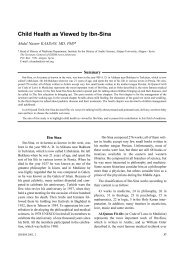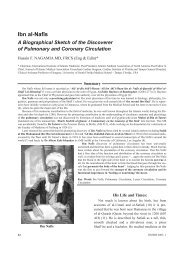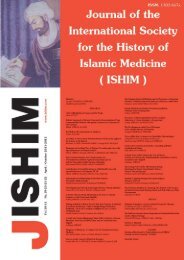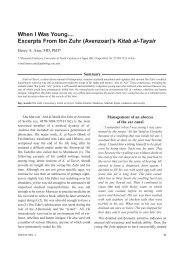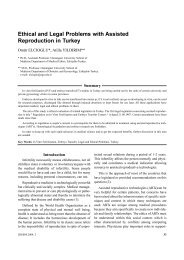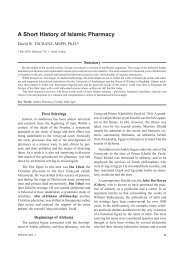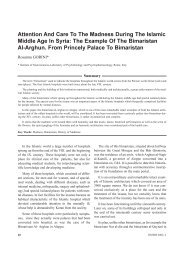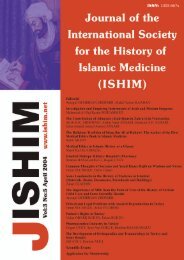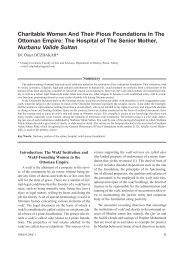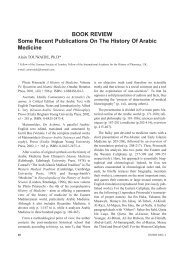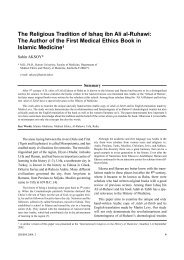Islamic Medicine History and Current Practice - International Society ...
Islamic Medicine History and Current Practice - International Society ...
Islamic Medicine History and Current Practice - International Society ...
- No tags were found...
Create successful ePaper yourself
Turn your PDF publications into a flip-book with our unique Google optimized e-Paper software.
Ibrahim B. SYEDSPIRITUAL MEDICINE IN THE HISTORY OF ISLAMIC MEDICINEThe Muslim prayer consists of contact prayer(salat), Zikr (Dhikr) or remembrance of Allah <strong>and</strong>recitation of the Qur’an. These elicit the physiologicrelaxation response.Spiritual medicine in IslamIn Islam Spiritual medicine can be used to meantwo different things, although both are allied <strong>and</strong>sometimes confused. One refers to the belief in aspiritual or ethical or psychological cure for diseasesthat may have physical or spiritual (or psychic).Thus, a physical illness may be cured, for example byrecitation of the Qur’an or other prayers (Du’a). Mostmedical men of Islam even in the scientific traditionof medicine recognized this belief to an extent.Ibn Sina is credited with psychic cures. Muslimphysicians practiced various forms of psychotherapysuch as shock or shame-therapy in the treatment ofmental illnesses <strong>and</strong> this treatment was original. Afamous Persian work titled The Four Essays (ChaharMaqala), written about 1155 AD for the ruler ofSamarq<strong>and</strong> by his court-poet, Nizami-Ye ‘Aruzi discussesadministrators, astronomers, poets <strong>and</strong> physicians.Each chapter gives definitions of an ideal personin each category followed by ten illustrativeanecdote (11). Ibn Abi Usaibi’a narrates about thetreatment by Jibra’il ibn Bakhtishu’ of a belovedslave-girl of the caliph Harun al-Rashid throughschock-treatment (12).Part of spiritual medicine in Islam is devoted toethical well being, but from a practical point of view.Thus Abu Bakr al-Razi wrote al-Tibb al-Ruhani(Spiritual <strong>Medicine</strong>) which has been translated intoEnglish as The Spiritual Physick of Rhazes. (13).In this work, al-Razi describes in detail the moraldiseases <strong>and</strong> discusses with acute perception howthese affect human behavior.The Moghul emperor Jehangir once suffered fromsome illness, which his doctors were unable to cure.Frustrated, he repaired to the tomb of the Saint Mu’inal-Din Chishti at Ajmer <strong>and</strong> was cured. Ever sincethen he wore earrings in the name of the saint as atoken of being his follower (14).Volumes of spiritual prescriptions for cures exist.Most prayers <strong>and</strong> amulets contain verses from theQur’an, to which high curative powers were ascribed.Very frequently, the recommendation is made that thepatient shall write down certain Qur’anic verses on apiece of paper or on a glass (ceramic plate) <strong>and</strong> aftersoaking these writings in water drink the water. Insouth-east Asian countries, sick people st<strong>and</strong> outsidethe mosques <strong>and</strong> the believers who are coming out ofthe mosques after performing the salat, recite certainQur’anic Surahs <strong>and</strong> blow air on the sick people.Khawass al-Quran (Miraculous Properties of theQur’an): The “miraculous properties” of practicallyeach passage of the Qur’an are discussed includingtheir curative properties for various diseases. It issaid that when Surah 38 (Saad) is recited on a sleepingperson it cures breathing problems; when writtendown <strong>and</strong> read during a patient’s waking hours, itcures illness. Aperson who continuously recites itwill be immune from all troubles at night (15).Sufi Shaikhs or pir are said to cure (16):* Sickness* Infertility* Problems with one’s job* Alleviate fear of failure in an exam* Demonic possession (mental illness)Al-Dhahabi (d.1348 AD)(17) says the benefits ofthe <strong>Islamic</strong> ritual prayers (salaat), which involve certainchanging physical postures, are fourfold: spiritual,psychological, physical, <strong>and</strong> moral. He further says:* Prayers cause recovery from pain of the heart,stomach, <strong>and</strong> intestines.* Prayers produce happiness <strong>and</strong> contentment inthe mind; they suppress anxiety <strong>and</strong> extinguishthe fire of anger. They increase love for truth<strong>and</strong> humility before people; they soften theheart, create love <strong>and</strong> forgiveness <strong>and</strong> dislikefor the vice of vengeance. Besides, oftensoundjudgment occurs to the mind (due toconcentration about difficult matters) <strong>and</strong> onefinds correct answers (to problems). One alsoremembers forgotten things. One can discoverthe ways to solve matters worldly <strong>and</strong> spiritual.And one can effectively examine oneselfparticularlywhen one strenuously exercisesoneself in prayers.48 JISHIM 2003, 2



